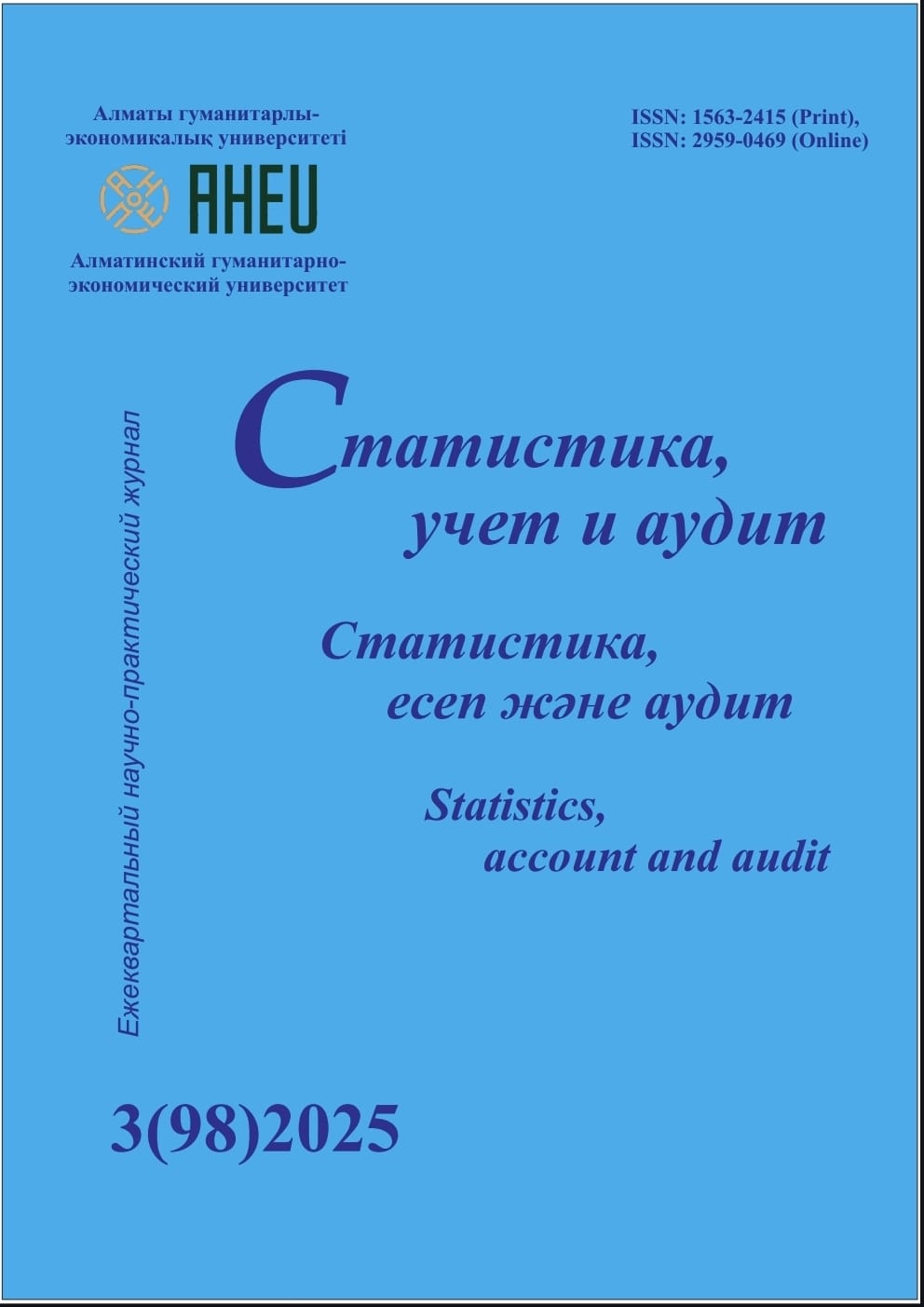ИСКУССТВЕННЫЙ ИНТЕЛЛЕКТ В АКАДЕМИЧЕСКИХ ИССЛЕДОВАНИЯХ: ВОЗМОЖНОСТИ, ВЫЗОВЫ И ПЕРСПЕКТИВЫ
DOI:
https://doi.org/10.51579/1563-2415.2025.-3.19Ключевые слова:
генеративный искусственный интеллект, академические исследования, AI-инструменты, креативность, исследовательская этика, технологии искусственного интеллекта.Аннотация
Искусственный интеллект, особенно генеративный искусственный интеллект (GenAI), выступает как мощный инструмент для повышения эффективности, глубины и масштабов академических исследований, предлагая поддержку на различных этапах научного процесса. Однако, наряду с прогрессивными возможностями, возникают серьезные вызовы, связанные с академической честностью, авторством, прозрачностью алгоритмов и потенциальной подменой человеческой аналитики машинными выводами. Поэтому важно оценить комплексное влияние интеграции GenAI на академическую среду. Особого внимания требует оценка его потенциала и ограничений с точки зрения научных исследований докторантов PhD, как одной из целевых групп, наиболее чувствительных к изменениям в академической среде, поскольку они одновременно и обучающиеся, и производители нового знания. Цель исследования – представить систематизированный обзор и оценку возможностей, рисков и практик применения GenAI в исследовательской деятельности, а также выработка практических рекомендаций по использованию инструментов, способствующих повышению эффективности научных исследований с учетом соблюдения этических норм и ответственного использования. На основе систематического обзора и контент-анализа современных научных публикаций рассматриваются ключевые направления использования AI, включая формулирование гипотез, подготовку обзоров литературы, визуализацию данных и поддержку публикационной активности. Особое внимание уделено вопросам академической честности и рискам подмены критического мышления машинной аналитикой. Представлены практические рекомендации для молодых исследователей, научных консультантов и разработчиков образовательных программ докторантуры.
Библиографические ссылки
Khalifa M., Al-Badawi M. The use of Artificial Intelligence in academic research: a systematic literature review // Computer Methods and Programs in Biomedicine Update. – 2024. – No. 5. – P. 1-11. https://doi.org/10.1016/j.cmpbup.2024.100145.
Zou Q., Zhao S. Exploring the impact of AI on research practices: a postdigital ethnographic study of doctoral students’ engagement with ChatGPT // Studies in Continuing Education. – 2025. – P. 1-17. https://doi.org/10.1080/0158037X.2025.2535565.
Douglas A.S. Engaging doctoral students in networking opportunities: a relational approach to doctoral study // Teaching in Higher Education. – 2020. – 28(2). – P. 322–338. https://doi.org/10.1080/13562517.2020.1808611.
Albertyn R.M. Doctoral intelligence: a framework for developing mindsets for doctorateness in changing doctoral contexts // Higher Education Research & Development. – 2024. – Vol. 43. – No. 5. – P. 1011–1025. https://doi.org/10.1080/07294360.2024.2315032.
Iatrellis O., Bania A., Samaras N., Kosmopoulou I., Panagiotakopoulos T. ChatGPT in doctoral supervision: Proposing a tripartite mentoring model for AI-assisted academic guidance // International Journal of Doctoral Studies. – 2025. – Vol. 20. – Article 9. – P. 1-26. https://doi.org/10.28945/5579.
Parker, J.L., Richard, V.M., Acabá, A. et al. Negotiating Meaning with Machines: AI's Role in Doctoral Writing Pedagogy // Int J Artif Intell Educ. – 2024. - Vol. 35. – Р.1218–1238. https://doi.org/10.1007/s40593-024-00425-x.
Rafi, M.S., Amjad, I. The role of generative AI in writing doctoral dissertation: perceived opportunities, challenges, and facilitating strategies to promote human agency // Discov Educ – 2025. – 4(165). https://doi.org/10.1007/s44217-025-00503-9.
Oliveira J. et al. Exploring the Adoption Phenomenon of Artificial Intelligence by Doctoral Students Within Doctoral Education // New Horizons in Adult Education and Human Resource Development. – 2024. – Vol. 36(4). – P. 248–262. https://doi.org/10.1177/1939422524128703.
Sabbaghan, S., Eaton, S.E. Navigating the Ethical Frontier: Graduate Students’ Experiences with Generative AI-Mediated Scholarship // Int J Artif Intell Educ. – 2025. https://doi.org/10.1007/s40593-024-00454-6.
Ren X, Zheng W and Zhang M Navigating cognitive dissonance: master’s students’ experiences with ChatGPT in dissertation writing // Front. Psychol. - 2025. – Vol.16. https://doi.org/10.3389/fpsyg.2025.1542559.
Chauke, T., Mkhize, T., Methi, L., & Dlamini, N. Postgraduate Students’ Perceptions on the Benefits Associated with Artificial Intelligence Tools on Academic Success: In Case of ChatGPT AI tool. // Journal Of Curriculum Studies Research. – 2024. – 6(1). – P. 44-59. https://doi.org/10.46303/jcsr.2024.4.
Krumsvik, R.J. Chatbots and academic writing for doctoral students // Educ Inf Technol. – 2025. – Vol. 30. - P. 9427–9461. https://doi.org/10.1007/s10639-024-13177-x.
Naznin K., Al-Mahmud A., Nguyen M. T., Chua C. ChatGPT Integration in Higher Education for Personalized Learning, Academic Writing, and Coding Tasks: A Systematic Review // Computers. – 2025. – Vol. 14. – No. 2. – Article 53. https://doi.org/10.3390/computers14020053.
Bista K., Bista R. Leveraging AI tools in academic writing: Insights from doctoral students on benefits and challenges // American Journal of STEM Education. – 2025. https://doi.org/10.32674/9m8dq081.
Long K. B., Adams K. R. Application of ChatGPT in Doctoral Education and Programming: A Collaborative Autoethnography // IGI Global. – 2024. https://doi.org/10.4018/979-8-3693-1054-0.ch008.
Buinytska O., & Smirnova, V. Artificial intelligence technologies in research activities: overview and application // Continuing Professional Education: Theory and Practice. – 2024. – No. 81(4). – P. 31–46. https://doi.org/10.28925/2412-0774.2024.4.2.
Giray L. Benefits and Challenges of Using AI for Peer Review: A Study on Researchers’ Perceptions // The Serials Librarian. – 2024. – No. 85(5–6). – P. 144–154. https://doi.org/10.1080/0361526x.2024.2428377.
Chubb, J., Cowling, P., & Reed, D. Speeding up to keep up: exploring the use of AI in the research process // AI & SOCIETY. – 2021. – Vol. 37(4). – P. 1439–1457. https://doi.org/10.1007/s00146-021-01259-0.
Titko, J., Steinbergs, K., Achieng, M., & Uzule, K. Artificial Intelligence for Education and Research: Pilot Study on Perception of Academic Staff // Virtual Economics. – 2023. – No. 6(3). P. 7–19. https://doi.org/10.34021/ve.2023.06.03(1).
Thomas, R., Bhosale, U., Shukla, K., & Kapadia, A. Impact and perceived value of the revolutionary advent of artificial intelligence in research and publishing among researchers: a survey-based descriptive study // Science Editing. – 2023. – No. 10(1). – P. 27–34. https://doi.org/10.6087/kcse.294.
Загрузки
Опубликован
Как цитировать
Выпуск
Раздел
Лицензия
Copyright (c) 2025 С.С. Таменова, Г.У. Хаджиева

Это произведение доступно по лицензии Creative Commons «Attribution» («Атрибуция») 4.0 Всемирная.









